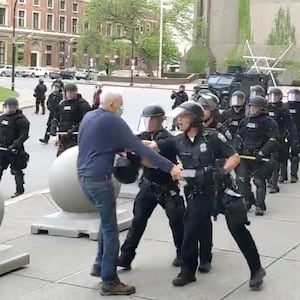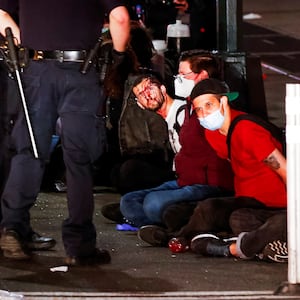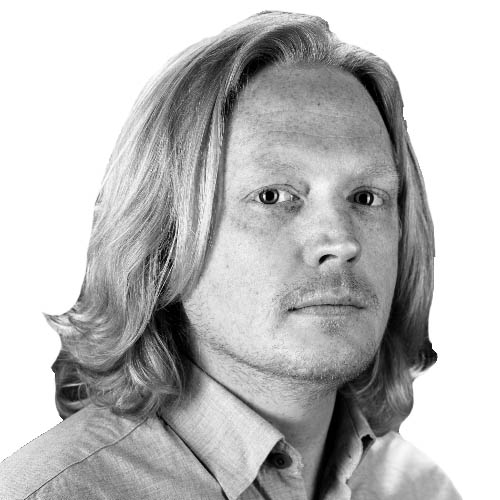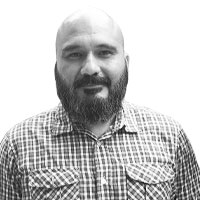Nearly two weeks into protests against the killing of an unarmed black man in Minneapolis police custody, a slew of different cities across the country have been forced to confront the brutal methods used by their own police officers as videos emerged of harrowing incident after harrowing incident.
And on Friday, it seemed a reckoning of sorts was in the air: Police officers in multiple cities were suspended, hit with charges, or stripped of their powers after they were caught on camera treating peaceful protesters like combatants.
In New York City, where earlier this week authorities had praised the police department’s “restraint” amid protests despite video evidence to the contrary, NYPD Commissioner Dermot Shea announced that two officers involved in violent encounters with protesters—including one woman who was violently pushed to the ground and a man who was pepper sprayed after his mask was pulled down—have been suspended without pay.
In Philadelphia, the District Attorney’s office filed aggravated assault charges against police inspector Joseph Bologna after a video showed him hitting a demonstrator with a metal baton. The demonstrator, a Temple University student who was also arrested and detained for 24 hours, needed ten staples and sutures in his head following Monday's incident in Center City.
Several states away, two Chicago police officers caught on video pulling a woman from a car by her hair before placing a knee on her neck have been stripped of their police powers pending an investigation, authorities said in a Friday statement.
But before the night was even halfway over, the illusion of change began to unravel. NYPD officers rushed dozens of demonstrators in Manhattan that were out past the 8 p.m. curfew, arresting people in droves and hitting several with batons. At least 10 protesters were arrested after the peaceful protest—several of whom chanted “black lives matter” while they were awaiting transport, according to City & State NY.
“This is outrageous. We were engaged in a non-violent protest. Stop arresting New Yorkers for no reason,” NYC Council Member Ben Kallos tweeted.
Across the river in Brooklyn, one protester told The Daily Beast he was pushed over by authorities—prompting other residents to shout and swear at officers pushing them to go home past curfew. After a tense stand-off in which cops yelled at reporters and pushed people who had been peacefully protesting onto the sidewalks, at least a dozen were arrested and directed into NYPD vans.
And in Buffalo, while there was a sense of accountability after the officers who shoved down 75-year-old Martin Gugino on Thursday night were suspended without pay, there was another sign of the rift between peaceful protesters and police officers as 57 fellow members of the Buffalo Police Department Emergency Response Team resigned in solidarity with the suspended officers.
In Minneapolis, where protesters continued to express outrage over the death of Floyd on Friday, demonstrators were skeptical of police being held accountable.

Zeque Davies, a 29-year-old whose parents emigrated to Minneapolis from Liberia, said the cities that have disciplined officers in recent days are “trying to prove a point through the media.”
“I don’t think they’re actually holding cops accountable,” Davies told The Daily Beast. “A slap on the wrist and a paid vacation is not holding a cop accountable. Trying him, arresting him and giving him a charge, that’s holding a cop accountable.”
Demonstrators in other cities weren't convinced that a simple suspension would solve any problems.
“I'm sure there are professional police officers. But what we're seeing is that unlike other departments or other services, when a police officer goes rogue, they kill people,” Tara Smith, 30, told The Daily Beast at a vigil held at Union Square in Manhattan. “A city clerk is not going to do the same kind of damage, so you can't tell me that they should not be held to a higher standard than other industries and other departments and services.”
Others pointed out that all the recent acts of brutality by police were happening even while people were filming them—raising the question of what happens when the cameras stop rolling.
Carolina Martinez, a bartender in Buffalo taking part in a peaceful protest on Friday, said it only took four hours for video of police officers shoving down a peaceful protester to garner worldwide attention a day earlier.
“The only thing we can do now is just continue to just broadcast it,” she said.
Residents still came out in droves on Friday to protest. In Washington, D.C., the mayor’s office commissioned “Black Lives Matter” to be painted across a street leading to the White House.
In New York, thousands of residents across the five boroughs took to the streets despite the rain. Upstate, in Buffalo, protesters gathered in Niagara Square demanding police reform one day after an elderly activist was shoved to the ground by officers.
The nation-wide demonstrations on Friday also focused on Breonna Taylor, the Kentucky EMT worker fatally shot in her home during a botched March police raid. On Friday, Taylor would have been 27-years-old. From New York to Portland to Miami, thousands of protesters sang Happy Birthday in Taylor’s honor. In Kentucky, dozens of demonstrators gathered in Jefferson Square Park in Kentucky to honor her memory, many writing birthday cards that will be sent to Taylor’s family.
In Miami, hundreds of residents took to the streets in a Black Lives Matter protest, forcing officials to shut down several highways and the mayor to change the city-wide curfew. The Miami Police Department closed Interstate 95 in both directions to allow space for the continued protesters chanting “say their names” near Wynwood.

“I think the protests are finally getting politicians and police departments to finally listen. Everyday it's a step forward,” Ashlynn Lee, 20, told The Daily Beast. Her friend, Tanisha Brown, 20, added: “They are definitely listening to what these protests are about. We are taking not only over the streets in the 50 states and different countries, but also social media. All you see when you scroll down is black lives matter. People are starting to shout it is definitely happening. Everybody is fighting for black lives.”
About an hour later, Miami-Dade Mayor Carlos Giminez moved the curfew to 10 p.m., after it was pushed back to midnight earlier this week. Alan, one protester who attended the Miami protests, called the mayor’s decision to bump up the curfew due to “unrest” a “bullshit move.”
“If it wasn't about Black Lives Matter and police reform, the protestors would be treated differently. There was no unrest,” Alan said.
In Minneapolis, the intersection where Floyd was killed has turned into a constant block party—complete with a stage that hosts speakers, spoken word artists, and rappers.
Robin Jackson, 27-year-who lives down the street, told The Daily Beast things are peaceful in the downtown Minneapolis neighborhood, for now. He added that while some Americans are reeling from Floyd’s tragic death, the black community is simply witnessing what they have known for years.
“I feel like this is just the acknowledgment among people other than Black people, where they can say, “Ok, maybe they have a point,” Jackson said. “They’re at least acknowledging that something is happening.”
The ongoing protests have already sparked police reform in two states. City officials in Minneapolis have agreed to ban police chokeholds while detaining suspects and require officers to intervene when they see unauthorized force used by a colleague.
In California, Gov. Gavin Newsom on Friday ordered the “carotid hold,” a neck restraint move that blocks blood flow to the brain, be removed from police training. Seattle Mayor Jenny Durkan on Friday announced a ban on the police use of tear gas for 30 days as protests are expected to continue in the city. The ban came just hours after three civilian police watchdog groups urged Seattle leaders to ban the violent tactic that public health officials believe may potentially increase the COVID-19 spread.
A federal judge in Denver Friday also ruled that police must limit their use of “chemical weapons or projectiles” and a number of other measures of force against protesters, calling the past actions of law enforcement nation-wide “disgusting.”

As demonstrators have continued to take to the streets, one medical worker in New York acknowledged that the health care community is concerned about how the protests will ultimately impact the ongoing coronavirus pandemic.
“Obviously it worries us because we’re afraid of a spike in coronavirus cases. We all work at a hospital and we know what that means when that happens,” Sushmitha Echt, an attending physician at Northwell Health, told The Daily Beast. “At the same time, we’re wearing our masks... there are certain things we just have to take a stand for. This is one of those things.”












